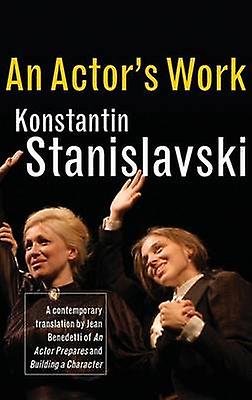§03. Action, « If », « Given Circumstances »(Konstantin Stanislavski, An Actor’s Work)

THEATRE
This article is my summary of the third chapter of An Actor’s Work by Konstantin Stanislavski. This book is a new edition and English translation by Jean Benedetti of the material previously published under the titles « An Actor Prepares » and « Building A Character« .
Previous chapter: §2. The stage as art and stock-in-trade (Konstantin Stanislavski, An Actor’s Work)
Next chapter: §4. Imagination (Konstantin Stanislavski, An Actor’s Work)
Table of contents: An Actor’s Work (Konstantin Stanislavski)
What is the basis of theatre and Acting ?
Theatre and Acting are about performing Actions.
“The basis of theatre is doing, dynamism. Acting is action – mental and physical.” (p. 40)
“Actions convey the essence of a part (…) We understand who [the people being portrayed] are through their deeds and actions.” (p. 55)
What is the difficulty with performing Actions on stage ?
When the actor is on stage, he forgets how he acts in real life.
“The theatre itself and its demand drive the actor towards [the dangerous habit of playing in general] (…). We must have the courage to acknowledge that, for many reasons when we make an entrance, before a packed house, when we must be creative art in public, we lose our sense of real life completely. We forget everything, how we walk, how we sit, eat, drink, sleep, talk, look, listen – in a word, how we act internally and externally.” (p. 57)
Instead of performing Actions as he would do in real life, the actor starts Playing “in General”.
What does it mean to Play in General ?
Playing in General means performing Actions “for actions’ sake” (p. 42), doing “mechanical, unfounded Actions”(p. 45), without any purpose.
“When all [the] things are done because they are written, and not because they are experienced in the heart and life of the role, then the actor has nowhere to go, and then ‘playing in general’ is the only way out for him. (p. 56)
What does an Action performed in General look like ?
An Action which is Played in General generally appears quick, superficial, chaotic and uncomplete.
“Mechanical, unfounded actions are performed extraordinarily quickly onstage, much more quickly than conscious, well-founded ones. (…) When your actions are mechanical, when you have no real purpose in mind, you have nothing on which to focus.” (p. 45)
“’In general’ is superficial and trivial. (…) ‘In general’ is chaotic and senseless. (…) ‘In general’ starts everything and finishes nothing.” (p. 57).
Why is Playing in General problematic ?
Actions performed in General being “empty, not experienced, they Communicate nothing essential” (p. 56).
“Real acting and playing ‘in general’ are incompatible. One destroys the other.” (p. 56)
How to stop Playing in General and to start performing Actions correctly ?
We need to learn again to act, on stage.
“We have to learn [to act internally and externally] anew, on the stage itself. (…) Learn to banish the theatre from the theatre.” (p. 57)
A correct Action should be well-founded, planned, Logical and complete.
“You should perform [action] in a way which is well-founded, apt and productive.” (p. 42)
“Everything that happens onstage must occur for some reason or other.” (p. 39)
“Stage action must be inwardly well-founded, in proper, logical sequence and possible in the real world.” (p. 48)
“You fight [playing ‘in general’] by introducing a foreign body into this messy playing, which will destroy it. (…) Introduce a greater element of planning into your acting and a more serious attitude to what you are doing. That will destroy the superficiality and the frivolousness. (…) Introduce logic and sequence into a role. (…) Make sure your work is complete.” (p. 57).
Two tools are available to the actor to help him perform a correct Action:
- The If
- The Given Circumstances
What is the “If”?
“If” means for the actor to ask himself: “what would I do if I would be in this or this situation?
“The secret of ‘it’, as a stimulus, lies in the fact that it doesn’t speak about actual facts, of what is, but of what might be… ‘if’… This word is not a statement, it’s a question to be answered. The actor must try to answer it.” (p. 50 s.)
“’If’ arouses an artist’s dynamism, which is mental rather than physical, but does so without forcing, through nature itself. The word ‘if’ is a spur, a stimulus to inner and outer creative dynamism. (…) Your nature, as an actor, [becomes] an urgent call to action ” (p. 51)
What are the Given Circumstances ?
The Given Circumstances describe the hypothetical situation introduced by the “If”. They provide the “substance for [the If]”.
“You must have a clear, personal view of all the Given Circumstances which you have brought together from the play itself, the direction, and your own creative imagination. (…) You must sincerely believe that such a life is possible in the real world. (…) “ (p. 53)
What about the Feelings ?
The actor shouldn’t be concerned with the Feelings. They will appear from themselves as a result of a correctly performed Action.
“When choosing an action, leave your feelings alone. They will appear of their own accord as a result of something which has gone before, that evokes [them]. (…) Don’t be concerned with the result.” (p. 43)
“Then the truth of the passions [that is, genuine, living, human passions, feelings, the actor’s own personal experiences] or feelings that seem true [that is not genuine passions, feelings or experiences, but a hint of them, a mood closely related to them, seeming like truth] will arise of their own accord.” (p. 53)
Previous chapter: §2. The stage as art and stock-in-trade (Konstantin Stanislavski, An Actor’s Work)
Next chapter: §4. Imagination (Konstantin Stanislavski, An Actor’s Work)
Table of contents: An Actor’s Work (Konstantin Stanislavski)